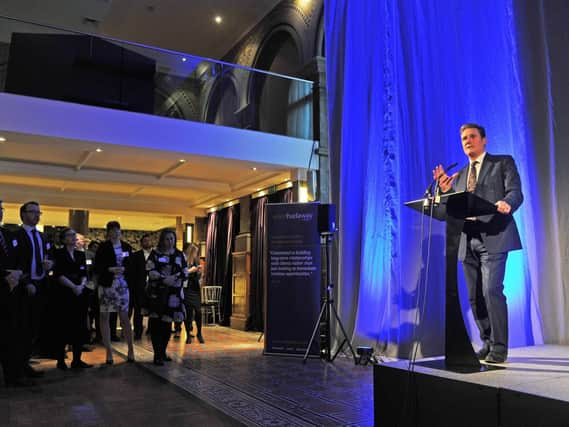The winners of the Ward Hadaway Yorkshire Fastest 50 to be revealed in online broadcast


However, the winners will still be revealed later this week during a live broadcast which can be viewed online.
In a statement, Ward Hadaway said: “We are extremely sorry to announce that the 2020 Ward Hadaway Yorkshire Fastest 50 Awards ceremony will not be going ahead as planned on Friday 20 March.
Advertisement
Hide AdAdvertisement
Hide Ad“Given the escalating situation around the coronavirus pandemic, the Fastest 50 winners will instead be broadcast via a live stream on Ward Hadaway’s LinkedIn page in a decision supported by The Yorkshire Post.


The statement added: “Although it is vital to celebrate the success, passion and inspiration of the region’s fastest growing, privately run businesses, it’s imperative that we protect Yorkshire’s thriving business community too.”
“Business continuity is a prerequisite for business growth. The companies who have been recognised in this year’s Fastest 50 are also some of the region’s biggest employers. It’s vital that they put in place contingency plans that will protect employees, suppliers and partners and, secondly, ensure disruption to daily business operations is mitigated.”
The Government has already announced measures to help businesses with the additional costs that managing the virus may incur, which were announced in last week’s Budget.
Advertisement
Hide AdAdvertisement
Hide AdGareth Yates, a partner in Ward Hadaway’s Leeds office, said: “It’s times like these during unexpected major periods of disruption that can really affect the foundations of even the strongest businesses.
“This is why, in phases of rapid growth and profitability, it’s also crucial that companies have in place robust continuity plans that are executed in times of turbulence or crises, just like we are currently experiencing on not just a national but global scale.
“It’s a great shame that we can’t come together in person and celebrate Yorkshire’s most progressive, dynamic businesses. Instead, we will now broadcast the Fastest 50 winners via a live stream on the Ward Hadaway LinkedIn page.
“Myself and Greg Wright from The Yorkshire Post will announce the winners so although you can’t join us in person, we hope you can tune in to find out who has won the Fastest Growing Small, Medium and Large Business awards.
Advertisement
Hide AdAdvertisement
Hide Ad“We’ll also be announcing the Overall Fastest Growing Business and the winner of our brand-new award, the One to Watch accolade which recognises the achievements of those businesses placed between 51 and 100 in the 2020 list.”
The Yorkshire Fastest 50 awards announcement takes place on Friday 20 March at 12.40pm. To watch the live broadcast, please visit the Ward Hadaway LinkedIn page: https://www.linkedin.com/company/ward-hadaway/.
Lawyers from Ward Hadaway have stressed the importance of putting in place a strong working from home strategy where possible that enables employees to work from home as they normally would from their usual place of work.
There may be several cases of needing to close the office if an employee is suspected of having the virus and, in this case, employees should work from home as normal.
Advertisement
Hide AdAdvertisement
Hide AdThe lawyers advise that, if an employee has the virus but feels well enough to work, as a business you should be able to ensure this can happen and adopt appropriate remote working facilities.
If an employee is too ill to work, the standard procedures for businesses on sick leave and pay apply. If an employee is ill or has flu-like symptoms, whether that is COVID-19 or not, and they are incapable of working, they will be entitled to sick leave and sick pay.
Employees who are absent from work due to sickness are generally entitled to Statutory Sick Pay (SSP) provided they meet eligibility criteria. They may also be entitled to contractual (or occupational) sick pay as well, depending on your arrangements. Normally, this entitlement is on the basis that they are incapable of work because of sickness (and not suspected sickness or self-isolation).
The latest guidance from Public Health England is that certain individuals should self-isolate at home for seven days if they have a new and persistent cough for up to four hours and a temperature of 37.8C and above.
Advertisement
Hide AdAdvertisement
Hide AdThe seven-day period is based on people being infectious just as their symptoms start to show and for a week afterwards.
For any employees who have recently travelled back from an area where the infection rate for coronavirus is high and have symptoms and/or are awaiting a test result, or those who have been identified as having been in close contact with someone who had the virus, should remain at home for 14 days and limit their contact with others.
The Chancellor has also announced that businesses with fewer than 250 employees will be refunded for SSP payments made during the 14-day self-isolation period. Prior to this, the Government made clear that the usual period of three waiting days will not apply so that employees will be eligible for SSP from day one of their absence.
Someone who is capable of work (and not sick at that time) but is known or reasonably suspected of being infected may also be entitled to SSP. An employee will be entitled to SSP if they are self- isolating on written advice from a GP (or NHS 111).
Advertisement
Hide AdAdvertisement
Hide AdBy law, employees are entitled to take a reasonable period of unpaid time off work to care for dependents due to unexpected events or in emergencies, such as the COVID-19 outbreak.
An employee taking time off to look after their children when a school has closed, or to care for an elderly relative when a carer is unavailable, has the statutory right to take a reasonable period of unpaid time off work.
Closing the business for a temporary period. It may become necessary at some point to close your business, especially if you work in a public space such as an office, factory or warehouse, and an outbreak at your place of work forces this.
Your employees should therefore remain on full pay and benefits as they are able, and willing, to work but can’t due to the business closure. It may be possible for some employees to work from home to maintain business continuity which can be requested by the employer.